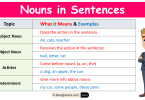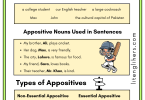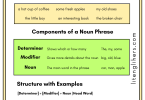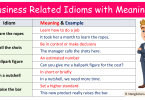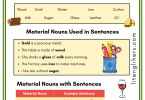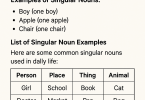Irregular verbs can be a bit tricky to understand, but they are essential to speaking and writing English correctly. These verbs don’t follow the standard rules of grammar and can change in different tenses. For example, the verb “go” changes to “went” when talking about the past. In this article, we will explore irregular verbs and their types of use, along with examples. So let’s get started!
What Are Irregular Verbs?
Irregular verbs add an interesting complexity to the English language. Unlike regular verbs, which form their past tense and past participle by adding ‘-ed’ to the base form, irregular verbs have their special ways of changing. These changes aren’t always easy to predict, which can make them a bit tricky for learners. For example, ‘go’ turns into ‘went’ when we talk about the past, and ‘gone’ when we want to say it’s already happened. Other irregular verbs like ‘be,’ where ‘am’ and ‘is’ are used for the present, ‘was’ for the past, and ‘been’ for the past participle. Learning these irregular verbs might take a little extra effort, but it’s a crucial part of getting good at English.
Here are some common examples of irregular verbs:
Go
- Present: I go to school every day.
- Past: Yesterday, I went to the park.
- Past Participle: I have already gone to the store.
Eat
- Present: I eat pizza for dinner.
- Past: Yesterday, I ate spaghetti.
- Past Participle: I have never eaten sushi.
Have
- Present: I have a toy car.
- Past: Last year, I had a bicycle.
- Past Participle: I have always had a love for music.
See
- Present: I see a bird in the sky.
- Past: Yesterday, I saw a rainbow.
- Past Participle: They have seen that movie three times.
Do
- Present: I do my homework after school.
- Past: Yesterday, I drew
- Past Participle: She has already done all the chores.
Come
- Present: I come home after playing.
- Past: Yesterday I came home early.
- Past Participle: They have already come back from their vacation.
Get
- Present: I got a present on my birthday.
- Past: Last year, I got a bicycle.
- Past Participle: He has finally gotten his driver’s license.
Make
- Present: I made a cake with my mom.
- Past: Yesterday, we made cookies.
- Past Participle: We have already made plans for the weekend.
Take
- Present: I take my backpack to school.
- Past: Yesterday, I took my umbrella.
- Past Participle: I have taken many photos.
Give
- Present: I give my friend a book.
- Past: Yesterday, I gave her a drawing.
- Past Participle: We have already given our old clothes to charity.
Conjugating Irregular Verbs – Rules and Examples
In this article, we’ll break down the rules and provide clear examples to help you become a pro at conjugating irregular verbs. Conjugating irregular verbs involves understanding how they change to represent past actions. Unlike regular verbs, which follow a predictable pattern, irregular verbs have unique forms for their past tense and past participle. Let’s explore the rules and provide examples for each group of irregular verbs:
Group 1: Irregular Verbs with Consistent Spelling
These verbs maintain the same spelling in both the simple past form and the past participle form. They are among the easiest to conjugate. These verbs stay the same in their base, past tense, and past participle forms, making them relatively easier to remember and use correctly in sentences. Keep practicing to become even more familiar with them!
Here are some examples:
Cut (Base Form) – Cut (Simple Past Form) – Cut (Past Participle Form)
- He cut the paper into a beautiful shape.
Put – Put – Put
- She carefully put the vase on the shelf.
Shut – Shut – Shut
- Please shut the door quietly.
Hit – Hit – Hit
- He hit the ball out of the park.
Bet – Bet – Bet
- She bet her friend that it would rain tomorrow.
Spread – Spread – Spread
- He quickly spread the butter on the toast.
Group 2: Irregular Verbs with Almost Identical Spelling
He quickly spread the butter on the toast. In this group, verbs keep the same spelling in both the simple past form and the past participle form, but there are a few exceptions. Group 2 includes irregular verbs that have almost identical spelling in both the simple past form and the past participle form. However, there are a few exceptions.
Here are six examples:
Cost (Base Form) – Cost (Simple Past Form) – Cost (Past Participle Form)
- The concert tickets cost a lot of money.
Cut – Cut – Cut
- He accidentally cut his finger while cooking.
Hit – Hit – Hit
- She hit the ball with great force.
Hurt – Hurt – Hurt
- The child accidentally hurt his friend while playing.
Let – Let – Let
- The kind neighbor let us borrow her lawnmower.
Read (pronounced “reed”) – Read – Read
- She read the entire book in one sitting.
Set – Set – Set
- He carefully set the table for dinner.
Shut – Shut – Shut
She firmly shut the window to keep out the cold. Remember, even though these verbs have similar spelling in all forms, their pronunciation or meaning may change based on the context. Keep practicing to become more confident in using them.
Group 3: Irregular Verbs with Different Spelling Patterns
This group comprises verbs with distinct spellings in their base form, simple past form, and past participle form. They require a bit more effort to remember. Group 3 consists of irregular verbs that follow unique spelling patterns across their base form, simple past form, and past participle form. While they may initially appear a bit tricky, understanding these distinct patterns is key to mastering these verbs. Let’s delve into this group with detailed examples to help you navigate through them with ease. Unlike Group 1 and Group 2, Group 3 irregular verbs require a bit more attention due to their varying spellings.
Here are some examples:
Begin (Base Form) – Began (Simple Past Form) – Begun (Past Participle Form)
- He decided to begin his journey early in the morning.
Break – Broke – Broken
- She accidentally broke her favorite vase.
Drive – Drove – Driven
- He carefully drove the car through the winding roads.
Drink – Drank – Drunk
- She had already drunk all of the lemonade.
Ring – Rang – Rung
- The church bells have rung for the wedding.
Sing – Sang – Sung
- She confidently sang the national anthem.
Swim – Swam – Swum
- They have often swum in the lake during summer.
Choose – Choose – Chosen
- She carefully chose her outfit for the special occasion.
Forget – Forgot – Forgotten
- He had completely forgotten about the meeting.
Write – Wrote – Written
- She has already written a beautiful poem.
Example Sentences of Irregular Verbs
To understand how irregular verbs are used, let’s look at some examples:
- She goes to school every day.
- He eats his favorite cereal for breakfast.
- They have a big family.
- I do my homework after dinner.
- We see birds in the park.
- He gets a toy on his birthday.
- She makes a sandwich for lunch.
- They take the bus to school.
- He gives his friend a high-five.
- The dog comes when called.
- She brings cookies to the party.
- He buys candy from the store.
- I built a tall tower with blocks.
- We drive to the beach for vacation.
- The vase breaks easily.
- She chose the red dress for the party.
- They sing a song together.
- The phone rings loudly.
- He swims in the pool every summer.
- She writes a story for school.
- They read books before bed.
- I sleep well at night.
- We meet our friends at the park.
- He flies a kite in the park.
- She drew a picture of a flower.
- They run in the race.
- He drinks milk with his cookies.
- She begins a new book.
- I forgot where I put my keys.
- We wear hats in the sun.
List of Irregular Verbs
Here is a list of some of the most common irregular verbs of time:
| Base Form | Past Simple (V2) | Past Participle (V3) |
| Be | Was/Were | Been |
| Do | Did | Done |
| Go | Went | Gone |
| Eat | Ate | Eaten |
| See | Saw | Seen |
| Get | Gave | Given |
| Make | Made | Made |
| Take | Took | Given |
| Come | Came | Come |
| Bring | Brought | Brought |
| Build | Built | Built |
| Drive | Drove | Driven |
| Break | Broke | Broken |
| Choose | Choose | Chosen |
| Sing | Sang | Sung |
| Ring | Rang | Rung |
| Swim | Swam | Swum |
| Write | Wrote | Written |
| Speak | Spoke | Spoken |
| Do | Did | Done |
| Run | Ran | Run |
| Forget | Forgot | Forgotten |
| Meet | Met | Met |
| Fly | Flew | Flown |
| Draw | Draw | Drawn |
| Drink | Drank | Drunk |
| Am | Was | Were |
| Are | Were | Been |
| Arise | Arose | Arisen |
| Awake | Awoke | Awaken |
| Bear | Bore | Borne |
| Bear | Bore | Born |
| Begin | Began | Begun |
| Blow | Blew | Blown |
| Beat | Beat | Beaten |
| Fall | Fell | Fallen |
| Forgive | Flew | Flown |
| Freeze | Froze | Frozen |
| Give | Gave | Given |
| Grow | Grew | Grown |
| Is | Was | Been |
| Know | Knew | Known |
| Lie | Lay | Lain |
| Mistake | Mistook | Mistaken |
| Mow | Mowed | Mown |
| Rise | Rose | Risen |
| Steal | Stole | Stolen |
| Throw | Threw | Thrown |
| Wear | Wore | Worn |
| Bid | Bade | Bidden |
| Bite | Bit | Bitten |
| Hide | Hid | Hidden |
| Ride | Rode | Ridden |
| Smite | Smote | Smitten |
| Stride | Strode | Stridden |
| Write | Write | Written |
| Become | Became | Become |
Read Also:

